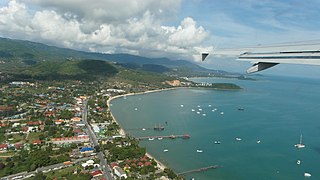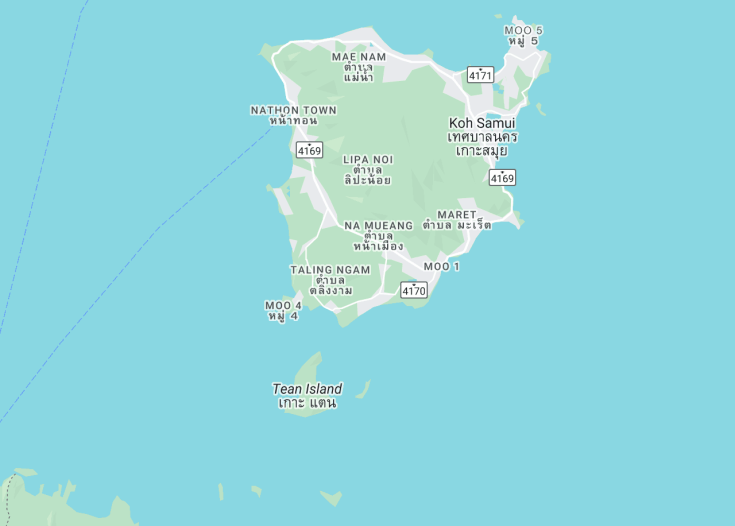Koh Samui, Thailand’s second-largest island, offers an enchanting blend of tranquility and adventure amidst its lush tropical landscapes. Renowned for its palm-fringed beaches, crystal-clear waters, and vibrant coral reefs, this island paradise caters to both relaxation seekers and adventure enthusiasts. The local culture, with its deeply-rooted Buddhist traditions, offers visitors a rich tapestry of experiences, from exploring ancient temples like Wat Phra Yai to enjoying the spirited festivals. Koh Samui’s luxury resorts and spas provide the ultimate in relaxation, making it an ideal retreat for those looking to unwind in a serene, yet culturally immersive environment.
To best experience Koh Samui, consider visiting during the dry season from December to February, when the weather is most favorable for beach activities and exploring the island.
For an enriching visit, rent a scooter to navigate the island at your own pace, allowing for spontaneous exploration of hidden beaches and local eateries.
Koh Samui: A Tropical Paradise
| Country | Thailand |
| Time in Koh Samui | GMT+7 |
| Language spoken | Thai |
| Population | 67,265 (source: Thailand Statistical Office 2021) |
| Currency | Thai Baht (฿, THB) |
| Airports | Samui Airport (SXI) (4 mi / 6 km). |
Koh Samui, Thailand’s second-largest island after Phuket, offers a spectacular blend of natural beauty, vibrant culture, and modern amenities. Its palm-fringed beaches, crystal-clear waters, and lush rainforest make it a favorite destination for tourists seeking both relaxation and adventure. Historically, it was a self-sufficient community, with no roads until the late 20th century, which maintained its pristine environment and traditional industries like fishing and coconut farming.
The island’s popularity skyrocketed in the 1980s when backpackers discovered its untouched beauty. Since then, Koh Samuisaw significant development in infrastructure, including luxury resorts and international cuisine, catering to a more upscale crowd. Despite this growth, Koh Samuir etains its charm through its friendly locals and cultural sites like the famous 12-meter tall Big Buddha statue at Wat Phra Yai temple, which attracts hundreds of visitors daily.
Conservation efforts are in place to balance tourism with environmental preservation, including marine life protections and regulations limiting large-scale developments. This harmony between nature and commercialism makes Koh Samuiunique, combining the tranquility of secluded beaches with the convenience of modern facilities, ensuring a remarkable experience for every visitor.
Where is Koh Samui?
Koh Samuiis located in the Gulf of Thailand, approximately 35 kilometers off the east coast of the Kra Isthmus, the narrowest part of the Malay Peninsula.
Distances:
| Route | Distance by car | Time by car |
|---|---|---|
| Bangkok to Koh Samui | 764 km | Approx. 11 hours |
| Chiang Mai to Koh Samui | 1,485 km | Approx. 22 hours |
| Phuket to Koh Samui | 335 km | Approx. 6 hours |
What is Koh Samuifamous for?
Koh Samuis renowned for its stunning beaches, full moon parties, luxury resorts, and the large golden Buddha statue at the Big Buddha temple.
History
Early History (Before 15th Century)
Koh Samui, an island situated off the eastern coast of Thailand, has been known to early mariners and traders for its abundant coconut groves and dense, mountainous rainforest. Archaeological finds, including tools and pottery, suggest that the island was first inhabited more than 1,500 years ago by fishermen and sea traders. The origin of the name ‘Koh Samui’ remains unclear, but some believe it derives from the Chinese word ‘Saboey’, meaning “safe haven”, which references its role as a shelter for fishermen during storms.
Development and Modernization (1970s-Present)
The 1970s marked a significant turning point for Koh Samui as it was discovered by backpackers looking for a serene getaway. The construction of its first airport in 1989 truly opened it to the world, increasing the influx of international tourists. Since then, Koh Samui has seen rapid development, evolving from a secluded hideaway into a bustling tourist hub. This growth has spurred improvements in infrastructure including better roads, enhanced healthcare, and the ongoing expansion of its airport. Despite modern changes, Koh Samui has strived to conserve its natural beauty and cultural heritage, making it a unique blend of traditional and modern influences.
Visit Koh Samui
What to see and do in Koh Samui
Explore the alluring island of Koh Samui, where the possibilities for adventure and relaxation are endless. Discover pristine beaches like Chaweng and Lamai, perfect for sunbathing and water sports. Visit the majestic Big Buddha statue at Wat Phra Yai or explore the natural beauty of Angthong National Marine Park. Delight in local cuisine at the Fisherman’s Village or take a day trip to the nearby islands of Koh Phangan or Koh Tao. For a deep dive into culture, participate in a Thai cooking class or rejuvenate with traditional Thai massages.
- Chaweng Beach – vibrant nightlife and bustling beach scene.
- Lamai Beach – quieter with natural beauty.
- Big Buddha – iconic landmark on a small island connected to Koh Samui.
- Angthong National Marine Park – a must-visit for nature lovers.
- Fisherman’s Village – charming area with local shopping and dining.
Events in Koh Samui
Koh Samui hosts a variety of cultural and fun-filled events throughout the year, offering something for every taste. The Songkran Festival in April transforms the streets into watery battlegrounds in celebration of the Thai New Year. In the fall, the buffalo fighting festival showcases traditional livestock battles which are a deep-rooted aspect of Samui’s culture. For sports enthusiasts, the Samui Regatta in late May gathers sailors from around the world in a prestigious sailing competition.
Best time to visit Koh Samui
The optimal time for a visit to Koh Samui is during its dry season from December to February when the weather is cooler and the rainfall is minimal. These months offer ideal conditions for beach activities and exploring the island’s numerous attractions without the interruption of frequent rains.
Is Koh Samui worth visiting?
Koh Samui is undoubtedly worth visiting for its impeccable combination of natural beauty, cultural richness, and modern conveniences. Whether you are in search of a luxurious beach resort experience, an adventure into tropical landscapes, or a deep cultural immersion, Koh Samui offers a diverse range of activities and experiences that cater to all tastes and age groups. The island’s unique atmosphere makes it a captivating destination for both relaxation and exploration.









